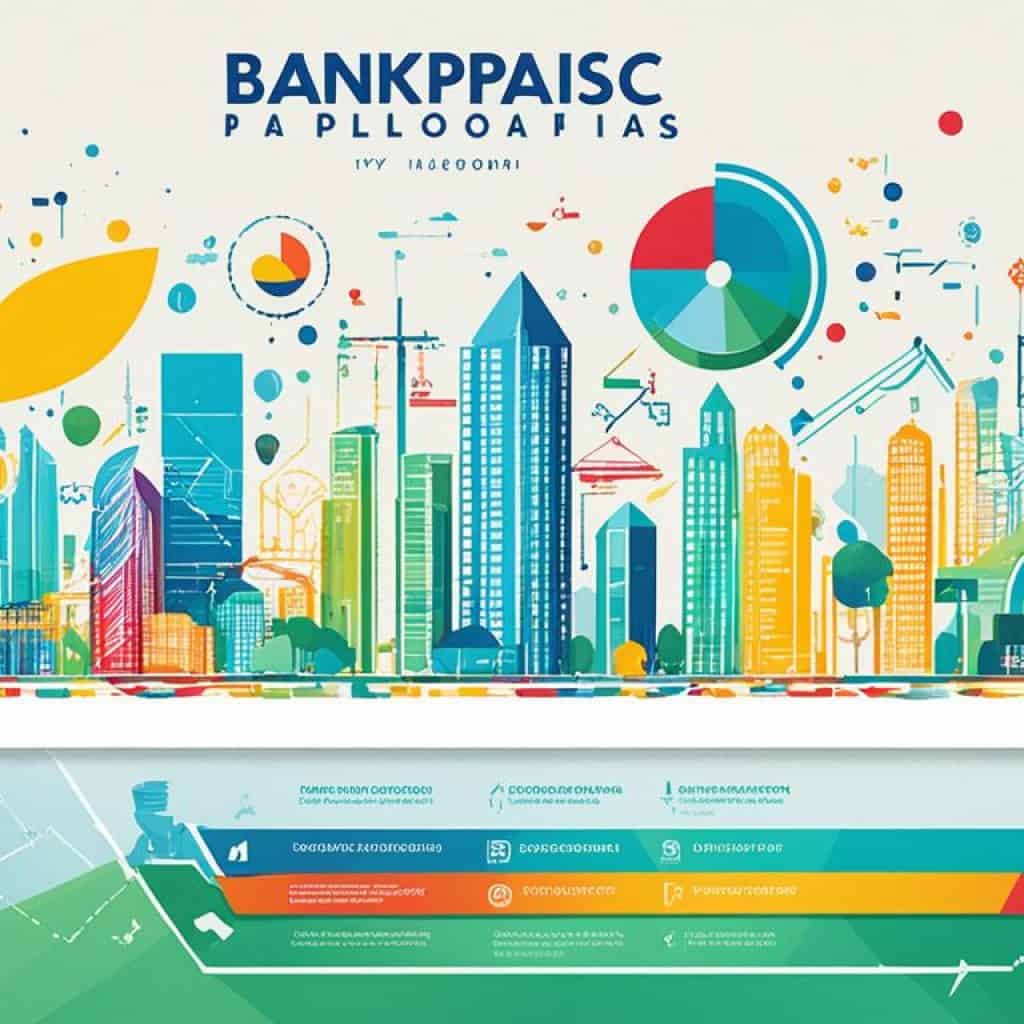Did you know that the banking sector in the Philippines is a key player in the country’s economic growth? The Philippines boasts a robust banking system, with major banks contributing significantly to the nation’s financial strength and stability. As the economy continues to expand, it becomes essential to uncover the top universal banks that are driving this growth and setting new benchmarks in the industry.
Key Takeaways:
- Discover the top universal banks in the Philippines that are leading the way in the banking industry.
- Learn about their diverse range of financial services and products that cater to various customer needs.
- Understand the significant role these banks play in the country’s economic growth and development.
- Explore the criteria to consider when choosing the best bank for your financial services.
- Gain insights into the eligibility requirements for opening bank accounts in the Philippines.
BDO Unibank INC
BDO Unibank INC is recognized as the largest bank in the Philippines, boasting a comprehensive range of financial products and services. With its extensive network of 1,200 operating branches and over 4,000 ATMs nationwide, BDO ensures accessibility and convenience for its customers.
With its stellar performance and commitment to excellence, BDO Unibank INC has earned numerous awards for its outstanding products. These accolades come from both local and international award-giving bodies, highlighting BDO’s dedication to delivering exceptional banking services.
In the third quarter of 2018, BDO reported an impressive 18% increase in earnings compared to the same period the previous year, demonstrating its strong financial performance and continued growth.
To emphasize BDO Unibank INC’s significant role in the Philippine banking industry, here is a brief summary of its key attributes:
- Largest bank in the Philippines in terms of assets
- Full-service universal bank
- Extensive network of 1,200 operating branches
- Over 4,000 ATMs nationwide
- Recipient of numerous awards for product excellence
- Strong financial performance with an 18% increase in earnings in Q3 2018
To provide further insight, here is a comprehensive table summarizing BDO Unibank INC’s financial performance:
| Financial Performance | Statistics |
|---|---|
| Total Assets | XXXXXXXXX |
| Number of Branches | XXXXXXXXX |
| Number of ATMs | XXXXXXXXX |
| Awards | XXXXXXXXX |
| Financial Performance | XXXXXXXXX |
With its extensive reach, exemplary services, and commitment to excellence, BDO Unibank INC continues to solidify its position as a leader in the Philippine banking industry.
Metrobank
Metrobank, the second-largest bank in the Philippines, offers a wide range of banking and financial products and services. With total assets amounting to 1,788,686.32 Million Pesos, the bank has established a strong presence in the country.
One of Metrobank’s key strengths is its extensive distribution network, consisting of 950 domestic branches and 30 foreign branches. This allows customers to conveniently access their banking services wherever they are. Additionally, the bank has 2,300 ATMs scattered nationwide, further enhancing accessibility for its clients.
In terms of financial performance, Metrobank has consistently delivered positive results. In Q3 2018, the bank reported a remarkable 55% increase in net income compared to the same period in the previous year. This growth can be attributed to the strong demand in various sectors, such as manufacturing, wholesale and retail trade, and real estate.
With its reputation for reliability and its commitment to providing excellent financial services, Metrobank continues to be a top choice for individuals and businesses in the Philippines.
Land Bank of the Philippines
Land Bank of the Philippines is a government-owned bank that is committed to serving the unique needs of farmers and fishermen in the country. As a trusted financial institution, Land Bank aims to support government development initiatives and contribute to the growth of the agricultural sector.
The bank operates a strong rural network, with a total of 395 branches strategically located across the country. In addition, it has 44 lending centers and 1,969 ATMs nationwide, providing easy access to banking services for its clients.
As of 31st December 2018, Land Bank of the Philippines reported total assets of 1,771,990.65 Million Pesos, demonstrating its solid financial position. The bank has experienced steady growth, with a remarkable 10% increase in net income in 2018 compared to the previous year.
Land Bank of the Philippines Financial Performance – 2018
| Financial Indicator | Amount (Million Pesos) |
|---|---|
| Total Assets | 1,771,990.65 |
| Net Income | 10% increase compared to the previous year |
Land Bank of the Philippines continues to be a reliable partner for the agricultural sector and the government’s development goals. Its strong presence in rural areas and commitment to providing financial support to farmers and fishermen make it an essential player in the country’s banking industry.
Bank of the Philippine Islands
Bank of the Philippine Islands (BPI) holds the distinction of being the first bank established in the Philippines, dating back to its founding in 1851. Over the years, BPI has grown to become one of the leading banks in the country, offering a comprehensive range of financial products and services to both retail and corporate clients.
BPI boasts a robust network of over 800 branches spread across the Philippines, Europe, and Hong Kong, making it highly accessible to customers. Additionally, the bank operates over 3,000 ATMs and CDMs, providing convenient banking services to its customers.
As of September 2018, BPI reported total assets of 1,701,049.95 Million Pesos, a testament to its strong financial standing. The bank has consistently displayed impressive financial performance, evident by its 12% increase in net income during the third quarter of 2018 compared to the same period in the previous year.
BPI’s steady growth and unwavering commitment to providing excellent financial services have solidified its position as one of the premier banks in the Philippines. With its extensive branch network and outstanding financial performance, BPI continues to be a trusted partner for individuals and businesses alike.
Philippine National Bank
The Philippine National Bank (PNB) is a government-owned institution that was established in 1916 to support the country’s industry and agriculture. With a wide network of 644 domestic branches, PNB serves as a key player in the Philippine banking industry.
PNB has demonstrated strong financial performance, with a total asset value of 843,332.89 Million Pesos. The bank’s commitment to supporting government economic efforts has resulted in a 67% increase in profit from January to September 2018.
In line with its growth strategy, PNB recently acquired PNB Savings, which has 63 domestic branches. This acquisition further strengthens PNB’s presence and expands its reach across the country.
PNB Financial Performance
The financial performance of PNB showcases its robust growth and stability. The bank’s commitment to core business growth, coupled with its support for government initiatives, has contributed to its success.
| Year | Profit Increase |
|---|---|
| 2018 (January to September) | 67% |
PNB’s significant profit increase reflects its dedication to delivering value to its stakeholders and driving sustainable growth in the Philippine banking sector.
PNB Branches
PNB has a widespread network of branches across the Philippines, ensuring accessibility and convenience for its customers. With 644 domestic branches, PNB serves both urban and rural communities, offering a comprehensive range of banking services.
Furthermore, the recent acquisition of PNB Savings adds an additional 63 branches to PNB’s network, strengthening its local presence and enabling more individuals and businesses to benefit from its services.
PNB’s Commitment to the Philippine Economy
As a government-owned institution, PNB is committed to supporting the country’s economic growth and development. Through its financial services and various initiatives, PNB plays a vital role in driving economic progress and improving the lives of Filipinos.
The success and growth of PNB are attributed to its unwavering commitment to serving the needs of its customers, supporting government initiatives, and embracing innovation in the ever-evolving banking landscape.
Security Bank Corp
Security Bank Corp is an independent bank that specializes in wholesale and retail banking and financial markets. With a total asset value of 736,019.32 Million Pesos, Security Bank Corp has consistently maintained stable financial performance, making it a reliable choice for customers seeking quality banking services.
In the first half of 2018, Security Bank Corp reported a profit of P4.3 billion, demonstrating its commitment to delivering value to its stakeholders. While this figure was 18% lower than the previous year’s profit, it was primarily attributed to a decrease in trading gain. Despite this minor setback, Security Bank Corp has proven its resilience and ability to adapt to market conditions.
Security Bank Corp has established a strong presence in the Philippines, operating a network of 302 branches and 713 ATMs strategically located throughout the nation. This extensive branch and ATM network ensures convenience and accessibility for customers, allowing them to seamlessly conduct their financial transactions whenever and wherever they need.
As an independent bank, Security Bank Corp strives to provide exceptional customer service and tailored financial solutions to meet the unique needs of its clients. Whether individuals, businesses, or organizations, customers can rely on Security Bank Corp for a wide range of banking services, including loans, deposits, investments, and more.
| Security Bank Corp Snapshot | |
|---|---|
| Total Assets (Million Pesos) | 736,019.32 |
| Profit in H1 2018 (Million Pesos) | 4,300 |
| Number of Branches | 302 |
| Number of ATMs | 713 |

China Banking Corp
China Banking Corp, also known as China Bank, is soaring to new heights as one of the leading private universal banks in the Philippines. With a commitment to excellence, China Bank offers a comprehensive suite of banking services tailored to both institutional and individual customers. The bank’s impressive total asset value of 727,706.14 Million Pesos reflects its strength and stability in the industry.
China Bank has achieved remarkable financial performance, reporting a consolidated net income of P3.6 billion from January to September 2018. This achievement is a testament to the bank’s dedication to delivering exceptional results and value to its customers.
Looking forward, China Bank plans to open additional branches in 2019, expanding its reach and further establishing its presence in the financial landscape of the Philippines.
Strong Financial Performance
“At China Bank, our commitment to financial success is unwavering. We are driven to provide excellent service and generate positive outcomes for our customers.”
To ensure its standing as a leading universal bank, China Bank consistently demonstrates strong financial performance. This allows the bank to solidify its position while continuing to innovate and provide cutting-edge financial solutions.
Diverse Banking Services
“China Bank is truly a one-stop shop, offering a broad array of services to cater to the diverse needs of our valued customers.”
China Bank prides itself on its extensive range of banking services, designed to meet the specific requirements of both institutional and individual clients. From traditional savings and checking accounts to innovative investment and loan products, China Bank strives to provide comprehensive financial solutions that empower its customers.
Expanding Reach
“At China Bank, we believe in making banking accessible and convenient for all. Our expansion efforts are driven by our commitment to offer top-notch services to a wider audience.”
China Bank is steadfast in its goal to expand its presence. By opening additional branches, the bank aims to bring its reliable and convenient services closer to more communities throughout the Philippines. This expansion is a testament to China Bank’s commitment to customer satisfaction and its dedication to making banking easier and more accessible for all.
Development Bank of the Philippines
The Development Bank of the Philippines (DBP) is a state-owned development bank that plays a crucial role in supporting various government development initiatives in the Philippines. As a strategic institution, the DBP aims to contribute to the country’s economic growth and promote sustainable development across different sectors.
With a total asset value of 632,603.68 Million Pesos, the DBP has established itself as a significant player in the Philippine banking industry. The bank’s financial performance has been robust, with a 13% growth in net income reported in Q3 2018 compared to the previous year.
DBP has an extensive branch network, with 127 branches and 10 Lite units located nationwide, ensuring accessibility and convenience for its customers. These branches serve as touchpoints for individuals, businesses, and communities to access the bank’s comprehensive range of financial products and services.
The Development Bank of the Philippines remains committed to its mandate of supporting the development goals of the government. The bank continues to foster financial stability, promote infrastructure development, and contribute to the overall progress of the country.
DBP Financial Performance (Q3 2018)
| Net Income | Growth Rate |
|---|---|
| 13% increase | compared to the previous year |
This financial performance indicates the bank’s strong financial stability, reinforcing its position as a reliable and trusted financial institution in the Philippines.

“The Development Bank of the Philippines continues to support the country’s development initiatives, contributing to sustainable growth and progress.” – Development Bank Executive
Union Bank of the Philippines
Union Bank of the Philippines is a publicly listed universal bank that has established itself as a key player in the Philippine banking industry. With a total asset value of 567,696.64 Million Pesos, Union Bank is known for its strong financial performance and commitment to innovation.
The bank reported an impressive 8% increase in net income in Q3 2018 compared to the previous year, reflecting its ability to adapt and thrive in a competitive market. Union Bank’s success is a testament to its dedication to delivering exceptional financial services to its customers.
Union Bank boasts an extensive network of 316 branches and 338 ATMs as of March 2018, providing convenient access to its services across the country. The bank’s focus on digitalization is also evident in its plans to digitize 30 to 40 branches by the end of 2019, ensuring a seamless and modern banking experience for its customers.
Recognizing Union Bank’s outstanding performance, the bank has received several awards for its innovation and leadership in the banking industry. These accolades further solidify Union Bank’s position as a trusted and esteemed financial institution in the Philippines.
Union Bank’s commitment to excellence and continuous improvement sets it apart as a top choice for individuals and businesses seeking reliable and innovative banking solutions. Whether it’s managing personal finances, growing a business, or investing in the future, Union Bank of the Philippines is dedicated to helping customers achieve their financial goals.
Rizal Commercial Banking Corporation
Rizal Commercial Banking Corporation (RCBC) is one of the oldest and largest conglomerates in the Philippines, operating in various sectors such as banking, insurance, education, and construction. Despite being classified as a small development bank, RCBC has made significant strides in the industry and has become a trusted name in the financial sector.
With a wide network of nearly 500 branches and 1,500 ATMs spread across the country, RCBC is committed to providing convenient and accessible banking services to its customers. Whether you’re looking to open an account, make transactions, or seek financial advice, RCBC’s extensive branch presence ensures that help is never too far away.
RCBC has also demonstrated a strong financial performance, reporting a net consolidated income of P3.2 billion from January to September 2018. Its core income has shown remarkable growth in comparison to the previous year, reaffirming RCBC’s commitment to excellence.
As an esteemed conglomerate, RCBC continues to play a crucial role in the Philippine banking landscape. With its commitment to exceptional service, accessibility, and financial success, RCBC remains a go-to choice for individuals and businesses across the country.
Other Major Banks
In addition to the top 10 universal banks in the Philippines, there are other major banks that play a significant role in the country’s banking industry. These include HSBC and Citibank, which are foreign banks with a significant presence in the Philippines. These major banks offer a wide range of financial services and contribute to the growth and development of the Philippine banking sector.

HSBC and Citibank, two major banks operating in the Philippines, bring a wealth of international banking expertise and services to the local market. As leading financial institutions, HSBC and Citibank have established a strong foothold in the country and are trusted by Filipino customers for their comprehensive range of banking products and services.
“HSBC and Citibank are renowned global banks that have seamlessly integrated into the Philippine banking landscape. With their extensive networks and expertise, they have become go-to choices for individuals and businesses seeking reliable and innovative financial solutions.”
HSBC, known for its global presence and diverse product offerings, has consistently demonstrated its commitment to supporting customers’ financial needs. Meanwhile, Citibank, with its extensive range of financial services, caters to both individual and corporate clients, providing tailored solutions to meet their unique requirements.
These major bank companies have been instrumental in driving the growth of the Philippine banking industry, contributing to the development of the country’s economy, and strengthening its financial infrastructure.
Understanding the Philippines Banking Sector
The Philippines banking sector is diverse and consists of several types of banks, each serving specific purposes and meeting the unique needs of different individuals and communities. Here are the main types of banks in the Philippines:
Universal Banks
Universal banks in the Philippines offer a comprehensive range of financial and banking services. They provide services to both individuals and businesses, including banking, investment, and insurance products. Universal banks have a significant presence in the Philippine banking industry and play a crucial role in driving economic growth and development.
Commercial Banks
Commercial banks primarily focus on serving businesses and individuals. They offer various banking services such as loans, deposits, credit cards, and payment solutions. Commercial banks play a vital role in supporting economic activities, facilitating trade and investments, and providing financial services to businesses and individuals.
Thrift Banks
Thrift banks, also known as savings banks, cater to the needs of individuals and small businesses. They primarily focus on providing savings accounts, personal loans, and other consumer financial products. Thrift banks play an important role in promoting financial inclusion and serving communities that may not have access to larger financial institutions.
Rural and Cooperative Banks
Rural and cooperative banks serve the specific needs of rural communities, farmers, and cooperatives. These banks provide financial services to support agriculture, rural development, and the cooperative sector. They play a crucial role in promoting financial empowerment and inclusive growth in rural areas.
Foreign Banks
Foreign banks also operate in the Philippines, offering various financial services to individuals and businesses. These banks bring international expertise and global connectivity to the Philippine banking sector, contributing to its growth and competitiveness.
“The diversity in the Philippines banking sector ensures that the financial needs of different sectors of society are met. From large universal banks to small rural banks, the industry plays a crucial role in fostering economic growth and providing financial services to all segments of society.”
The banking sector in the Philippines is regulated by the Bangko Sentral Ng Pilipinas (BSP), the country’s central bank. The BSP ensures the stability and soundness of the banking system by implementing policies, monitoring compliance, and promoting a safe and secure financial environment for both banks and consumers.
Who Can Open Accounts With Banks in the Philippines?
Opening a bank account in the Philippines is an accessible process for a wide range of individuals, including non-residents, foreigners, tourists, and residents. Banks in the Philippines cater to the diverse needs of customers and offer various types of accounts to suit different requirements.
Non-residents have the option to open deposit accounts in foreign currencies, such as USD, which is beneficial for those who frequently deal with international transactions or hold foreign income. This allows non-residents to conveniently manage their finances in the currency of their choice.
Residents, on the other hand, have more extensive options when it comes to opening bank accounts. They can choose from a variety of savings accounts, deposit accounts, and foreign currency accounts, depending on their financial goals and preferences. Whether it’s a basic savings account for everyday banking needs, a high-interest savings account to grow savings faster, or a foreign currency account to hold and transact in a specific currency, residents have a range of choices to suit their specific requirements.
It’s important to note that the exact eligibility criteria for opening a bank account may vary depending on the bank and the type of account being opened. However, most banks in the Philippines have relatively lenient requirements for account opening, making it accessible to a wide range of individuals.
Key Points:
- Opening a bank account in the Philippines is accessible to non-residents, foreigners, tourists, and residents.
- Non-residents can open deposit accounts in foreign currencies, such as USD.
- Residents have more options and can choose from various types of accounts, including savings accounts, deposit accounts, and foreign currency accounts.
- The eligibility criteria for account opening may vary depending on the bank and the type of account.
Overall, the process of opening a bank account in the Philippines is straightforward and convenient, providing a safe and secure way to manage personal finances, regardless of an individual’s residency status or nationality.
| Benefits of Opening a Bank Account in the Philippines | Eligibility Criteria | Types of Accounts Available |
|---|---|---|
| Convenient management of finances | Non-residents, foreigners, tourists, and residents | Savings accounts, deposit accounts, foreign currency accounts |
| Access to a secure banking system | Vary depending on the bank and account type | Basic savings accounts, high-interest savings accounts |
| Opportunity to earn interest on savings | Foreign currency accounts for USD and other currencies | |
| Convenient foreign currency transactions |
Conclusion
The Philippine banking industry is a robust and diverse sector, consisting of various types of banks that cater to the financial needs of individuals and businesses. From top universal banks to commercial banks, thrift banks, and rural and cooperative banks, the industry offers a wide range of financial services tailored to different customer requirements.
These banks play a vital role in driving the country’s economic growth and development. With their extensive branch networks and innovative financial solutions, they provide individuals and businesses with the necessary tools and resources to manage their finances effectively and achieve their financial goals.
Whether you are a resident or a non-resident, there are options available for opening a bank account in the Philippines. When selecting a bank, it is essential to consider factors such as reputation, financial performance, branch network, and customer service. You should choose a bank that not only meets your specific banking needs but also provides excellent service and support.
For the best financial services in the Philippines, consider the top universal banks that have a strong presence in the country. These banks have proven track records, sound financial performance, and a wide range of products and services to offer. By choosing one of these top universal banks, you can enjoy the benefits of quality banking services and experience the convenience and reliability they provide.


















Add comment